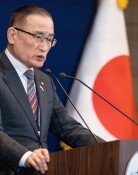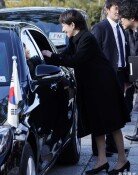US Warns North Korea Will Pay Heavy Price for Nuke Program
US Warns North Korea Will Pay Heavy Price for Nuke Program
Posted December. 31, 2002 23:04,
The IAEA inspectors were expelled from North Korea, who had resided there to monitor the nuclear facility in Yongbyon, North Korea. On December 31, last year, the United States, while repeatedly warning North against serious consequences, stressed the possibility of resumption of dialog and demanded a positive change on the part of North Korea.
▽ Withdrawal of IAEA inspection team = Two IAEA inspectors residing in Yongbyon, North Korea, left North upon its request and arrived at Beijing at 9:40 a.m. on December 31 (10:40 a.m. KST) onboard Koryo Airline Flight 151.
The two inspectors, consisting of one Lebanese man and a Chines women, just said, "We are told not to make any comments," and did not answer any questions of the press. Then, they left the airport. Originally, three inspectors stationed in North, one of whom had left earlier on December 28 upon North`s decision to expel them prior to the two inspectors.
Any inspection activities of the IAEA in North has been totally nullified by the departure of the remaining two inspectors. So far, North Korea has broken the seals on the nuclear facilities and shut down all the cameras. In addition, it has expelled all the inspectors that had conducted inspection under the 1994 arms control accord between North and the United States.
▽ Bush administration = White House spokesperson Scott, who was accompanying President George W. Bush, warned in the December 30th press conference, "As long as North Korea pushes ahead with its current nuclear development program, it will continue paying heavy prices for it. And the international community will not assist it."
He went on to say that the entire world was ready to help North Korea. As long as North kept the present path, it would not receive any necessary benefit or help from the world. Then, he stressed, "North Korea is the only country that isolates itself. It continuously insists on the isolation path." But State Department spokesperson Philip Reeker emphasized on the same day, "The United States is ready for opening a bold dialog with North Korea to improve relations." He added, "No one in our administration has suggested sanctions against North at this point. Secretary of State [Colin Powell] has not requested any country to take any economic action against the poor and desperate North Korea." The New York Times analyzed the comments of the spokespersons on the possibility of talks with North, and reported that their comments indicated the shift of focus from sanctions to talks, even though the United States did not back away from its position that North should first abandon its nuclear program to resume talks with the United States.
Gee-Hong Lee sechepa@donga.com






![[단독]김경 “1억원 줄때, 강선우도 함께 있었다” 자수서](https://dimg.donga.com/c/138/175/90/1/wps/NEWS/IMAGE/2026/01/14/133148772.5.jpg)
